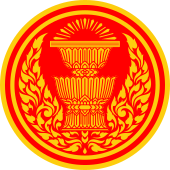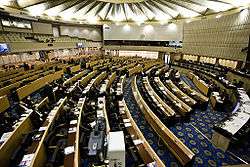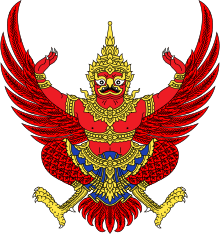National Legislative Assembly of Thailand (2014)
| National Legislative Assembly สภานิติบัญญัติชาติ (Sapha Nitibanyat Haeng Chat) | |
|---|---|
 | |
| Type | |
| Type | |
| Leadership | |
|
Pornpech Wichitcholchai Since 17 August 2014 | |
First Vice President |
Surachai Leangboonleodchai Since 17 August 2014 |
Second Vice President |
Peerasak Phorchit Since 17 August 2014 |
| Structure | |
| Seats | 220 seats |
Political groups | Appointed from various sectors by the National Council for Peace and Order |
| Meeting place | |
 | |
| Parliament House of Thailand, Dusit, Bangkok, Thailand | |
| Website | |
|
www | |
 |
| This article is part of a series on the politics and government of Thailand |
|
|
|
|
|
The National Legislative Assembly of Thailand (Thai: สภานิติบัญญัติชาติ; rtgs: Sapha Nitibanyat Haeng Chat; abrv: NLA) is the unicameral legislative branch of the government of Thailand. The National Legislative Assembly was established after the National Council for Peace and Order (NCPO), the current military junta, ratified the 2014 interim constitution of Thailand, thus making the NLA the only parliamentary body of Thailand for the period of military rule.[1]
The institution was created to replace the elected National Assembly of Thailand after General Prayut Chan-o-cha seized power from the civilian caretaker government during the 2013-14 Thai political crisis. Alongside the NLA, there is another body established by the NCPO to implement political and social reforms, the National Reform Steering Assembly, which replaced the National Reform Council.
Composition
The non-partisan NLA at inception was to consist of no more than 220 members appointed from various sectors of the country by the NCPO and approved by the king. Of the 200 initial NLA members, 97 were military officers, (69 on active duty), eight police (four on active duty). The remaining 85 members were former senators, university rectors, and business people.[2] [3]In early-May 2016, an article in the Journal of Contemporary Asia reported that the average income of the members of the NLA is 32 times the per capita income (US$5,778) in Thailand.[4]
The 2014 interim constitution was subsequently amended to enlarge the NLA to 250 members from 220, effective 2 September 2016. The military government appointed 200 NLA members after the coup in May 2014. Twelve resigned, two died, and 31 more were added. To fully populate the NLA, in October 2016, Gen Prayut Chan-o-cha submitted a list of 33 new NLA appointees to the king for royal approval. Twenty-eight of the 33 are military or police general officers, most of them serving officers. As legislators they will not receive salaries. Instead, each one is paid a "position allowance" of 71,230 baht per month with an "extra allowance" of 42,330 baht a month. State officials are not permitted to receive salaries from more than one source, but may accept unlimited position allowances and other compensation so long as the compensation is not called "salary".[5]
References
- ↑ "CONSTITUTION OF THE KINGDOM OF THAILAND (INTERIM) B.E. 2557 (2014); National Legislative Assembly (Sections 06-14)". Siam Legal. Retrieved 21 May 2016.
- ↑ "Junta chief defends make-up of National Legislative Assembly". The Nation. 2014-08-02. Retrieved 20 May 2016.
- ↑ Tonsakulrungruang, Khemthong (2014-08-25). "Thailand's National Legislative Assembly". New Mandala. Australian National University (ANU). Retrieved 20 May 2016.
- ↑ Macan-Markar, Marwaan (2016-05-19). "Thailand Inc. cozies up to the junta". Nikkei Asian Review. Retrieved 20 May 2016.
- ↑ "28 of 33 new lawmakers have ranks". Bangkok Post. 8 October 2016. Retrieved 8 October 2016.